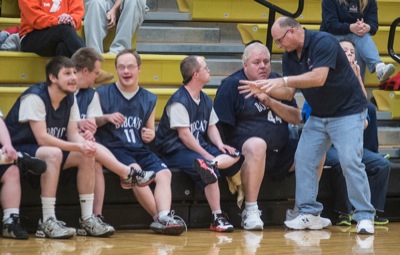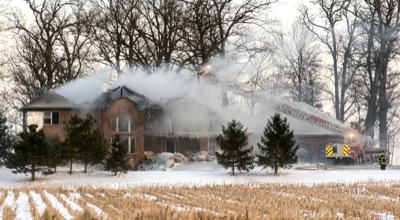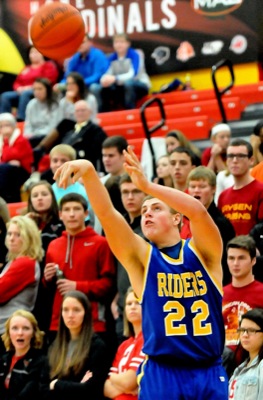Thursday, January 23rd, 2014
Cheek will be honored with Ed Baker Award
Last Curtain Call
By Robb Hemmelgarn
Carson Cheek never goes anywhere without packing a story or two on a wide variety of topics.
Engage him on something as simple as a track meet from the early 1980s and the 1965 Rockford High School graduate could energetically speak for an hour about it as well as a host of spinoffs from one simple event.
From 1972-1988, Cheek served Minster Local Schools as a teacher, athletic director and guidance counselor, but most notably he coached the boys' track and field team for nearly 20 years. When the Midwest Athletic Conference was born in the mid-1970s, Cheek had a front row seat in pouring the foundation of what would later become the most powerful small-school conference in Ohio.
"I was fortunate enough to be involved when the MAC was just getting started and it was quite an experience," said Cheek, who also started Minster's junior high track and field program as well as implementing girls' athletics at the school. "We wanted to have each of the schools field as many teams in as many different sports as they could, and everyone was on board for a fresh start. Once we ironed out a lot of the details, we did pretty well and continue to do very well in all sports today."
Cheek began coaching track at the varsity level in 1972 - while Minster was affiliated with the Tri-County League - and admits that the sport and the training which went into it were rather primitive.
"I can remember watching one of my very first track practices indoors," said Cheek, who helped begin the Minster Memorial Invitational in 1977. "One of the boys had a pole vault pole, and after a running start vaulted into a trampoline on the other end of the gym. He ended up straddling the bar at the edge of the trampoline when he landed, so needless to say, I don't think it was a very pleasurable experience. That was my introduction to pole-vaulting, but times have changed a lot as far as practices are concerned."
As Cheek does best, his pole-vaulting account morphed into another thought about parts of the sport that are an aspect of the past, or at least somewhat illegal.
"Joe Dittiro was Minster's football coach and my assistant when I first got into coaching, and back then schools didn't have a lot of hurdles, so to be sure that we could get all of our hurdlers in their events, we loaded 10 or 12 hurdles onto the bus to take with us," he said. "One time we were pulled over by the highway patrol and after explaining why we had all of those on the bus, he just told us that we had to move them out of the aisles. After that, we were able to go on our way."
Cheek explained that when he inherited the track program, his numbers were not very favorable, so he turned to some unique recruiting practices that today would likely raise some eyebrows at the very least.
"I always went around and tried to get kids to join before the season began," he pointed out. "I hung a sign outside of the cafeteria one year that announced the first meeting to determine who would be joining. In small print near the bottom of the sign, I added that there would be free beer. I knew the kids weren't obviously old enough to drink, but the turnout was pretty good for the meeting. I explained to them that I was sure there was beer somewhere, but it wasn't going to be at that meeting. I also used to have a board outside of the cafeteria with the results from every meet. I had all of the kids' names with a comment about their last meet no matter how large or small their accomplishments. It helped the kids feel like a part of the team and the other kids in school always enjoyed catching up on what was happening on the track."
While at Minster, Cheek's teams enjoyed sending athletes to the state track and field meet in 13 of his 15 seasons, and when recalling his list of athletes and top performers, the list was extensive because he didn't want to neglect to leave anyone out.
"I was fortunate to have a lot of outstanding athletes, who did well locally and at the state level," said Cheek, whose Wildcats placed third in the state meet in 1988. "Even the guys who didn't advance quite as far had a part in making us a successful program. They were always a lot of fun to coach. One time a kid told me that going to practice wasn't always the most fun, but he really enjoyed my enthusiasm and it made practice much easier. That made me feel good. I learned from a lot of great coaches and always had good assistants like Earnie Jones and Larry Topp. We wanted the kids to have fun, so we tried to make it that way while also pushing them to achieve their goals."
Cheek hung up his whistle for good in 1988, but has kept a tight eye on the track and field scene ever since, including publishing the Ohio Track and Field and Cross Country News from his home in rural St. Henry for more than 20 years. He was also a long-time and award-winning track and field official and was the Director of the MAC track and field meet for more than a decade.
Cheek is currently the historian for the Ohio Association of Track and Cross Country Coaches (OATACC) and is the association's cross country clinic director. He was previously inducted into the Northwest District and Ohio Athletic Director Association's Halls of Fame and now will be honored with his loftiest accolade to date. On Friday, Cheek will be awarded the Ed Barker Award, which is bestowed by the OATACC to an individual who has shown "the most exceptional service to the association and to the sport of track and cross country in Ohio."
Not one to dwell on personal achievement, Cheek was noticeably bashful when discussing the award.
"I have gone to this banquet, along with many others, over the past 40 years and always wondered what I would say if I had the opportunity to accept the award," he explained. "I am really looking forward to it because I will have the opportunity to thank everyone who helped me along the way and express how grateful I am for their assistance. I was always blessed with great kids who were eager to learn and listen, and anytime you have that it makes a coach's job much easier."



